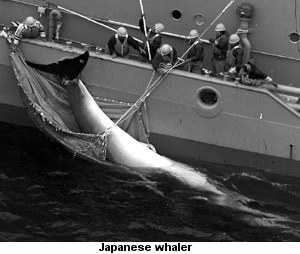
| Glasgow Digital Library | Voyage of the Scotia | BRUCE | PEOPLE | SHIP | ANTARCTIC | INDEX |
|---|
'After five-six years the catch is already markedly diminished'
William Speirs Bruce
The number of whales caught in the first half of the 20th century caused a huge reduction in the number of whales in the world. Between 1904 and 1964, one million whales were killed.
Bruce suggested in 1911 that an expedition should be organised to study whales in the southern oceans. Whale oil at that time was sold at £40 a ton. The Discovery expedition from 1929-1937 made a study of whales.
In the 1930s, 75% of the whales caught in the world were coming from the Antarctic region, where the catch was over 30,000 whales a year. The peak was reached in the summer of 1937-38 when 58,000 were killed.
Whaling resumed after the second world war with large factory ships returning to the southern oceans. The new Russian whale factory ship was 36,000 tons. (Compare this with the whalers at the beginning of the century of 400-600 tons.)
In 1947 the International Whaling Commission was formed to provide scientific data about whales and to regulate the catch. The decline of the blue whale was followed by the decline of the fin and sei whales. Britain's last whale factory ship - the 20,000-tonne Southern Harvester - was sold in the 1960s and by the 1970s only Russia and Japan were still whaling.

Japan is the main deep-sea whaling country, although smaller whales are still caught in the coastal waters of some countries. Officially the whales are killed for research purposes. Some people think this is a cover for private whaling activities.
Between April and July in 2000, 43 brydes whales, 40 minke whales and five sperm whales with killed. In 2001 a request was made to catch 100 minke whales, 50 brydes whales and ten sperm whales. Whale meat is available in markets in Japan and the oil is used in ice cream and in cosmetics.
Many people wish to stop the hunting of these marvellous creatures. Their slaughter is unnecessary and inhumane. The environmental group Greenpeace has physically tried to stop the Japanese whaling operations.
Salvesens of Leith
Christian Salvesen developed as an important shipping company based at Leith in Scotland. Most of their ships were cargo ships, but they had whaling operations in Antarctic waters. Their last whale factory ship was scrapped in the 1960s; the company is now mainly involved in road transport. Lord Salvesen was the first chairman of Edinburgh Zoo. (William Bruce was vice-chairman). The Antarctic connection resulted in the famous collection of penguins in the zoo.
| Glasgow Digital Library | Voyage of the Scotia | BRUCE | PEOPLE | SHIP | ANTARCTIC | INDEX |
|---|